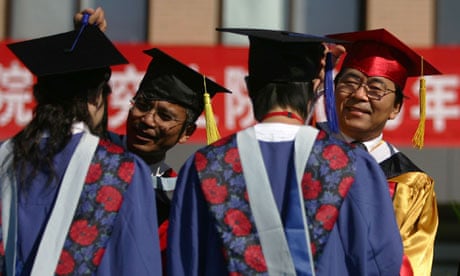"You just don't understand China!" This has become a daily exasperation as I debate with my Chinese colleagues on some aspects of their country. I arrived in China four months ago as a visiting researcher on Chinese foreign policy, and my long-suffering colleagues have gone beyond the call of duty to help me come to terms with China's politics, society, worldview and how they themselves understand it.
China has just surpassed Japan as the second largest economic power in the world. It is also known for its work-obsessed students, who each year compete to earn a much sought-after place at university. As prestige is closely associated with education, you would imagine Chinese universities to be centres of excellence and critical scholarship. You would be wrong.
An article in the Economist has recently highlighted a fact that is well known in China, but less so in the western world. Chinese academia is marked by fraud and poor academic ethics, which may hamper the country's drive for an innovative economy and its continual rise to "great power" status. What in the west is considered serious misconduct (cheating at exams, fabricating research data, ghostwriting or plagiarism come to mind) are routine practices and seldom punished. I wish I might tell you otherwise, given how warmly I am received here, but an independent, free and critical academia does not yet exist in China.
Chinese universities are modelled after civil services where most of those who are in charge are party members, not scholars. The chancellor of a top national university enjoys the equivalent ranking of a national government minister, and provincial universities' chancellors, provincial government ministers. Instead of being isolated ivory towers of academic research where quality research is the ultimate criterion for recognition, Chinese universities are places of hierarchy, patrimony, control and power struggles where personal networks outweigh academic ability.
In my experience, interviewing established professors is sometimes akin to having an audience with a ranking mandarin. They respond anecdotally from a position of superiority, confident with their privileged access to information, their influence on policy and their status in society. Attempts at engaging in academic debate are often dismissed with sighs of "you just don't understand China" and if pressed a little harder, accusations of western imperialism are almost inevitable.
Some of the younger generation of scholars complain privately of having to produce research on demand, of having to censor themselves on "sensitive topics" and having to deal with an unfair system that recognises seniority rather than originality and quality. But those who are unhappy with the system are in the minority; the majority of them are satisfied with their lot and are biding time until they too take up more senior positions.
The roots of the dismal state of higher learning in China today can be found in the cultural revolution. The current generation of professors began their careers just after a generation of intelligentsia, many of whom learned in both Chinese and western scholarship, were purged as counter-revolutionaries. The current generation have navigated their academic careers with the utmost care and diffidence, with little mentoring from previous generations and isolated from critical scholarly communities beyond China.
A recent comment by Premier Wen Jiabao that Chinese universities need to transform and be converted from a government civil service to centres of research was met with strong resistance from entrenched interests. Speaking as representatives of the National People's congress and as committee members of the Chinese people's political consultative committee, university chancellors argued that dissociating universities from government structures will lessen the value and effectiveness of Chinese education.
A strong and independent intelligentsia and academia reflects a stable and mature society – one that is secure enough to listen to criticism, reflect and reform. In its ideal form, the core of academia is freedom to debate. In On Liberty, John Stuart Mill argued that no opinion ought to be censored as "… if the opinion is right, they are deprived of the opportunity of exchanging error for truth: if wrong, they lose, what is almost as great a benefit, the clearer perception and the livelier impression of truth, produced by its collision with error".
Presented with this ideal, my Chinese colleagues respond that this is a grand ideal but it cannot be done in China – I disagree. Perhaps I don't understand China after all.
